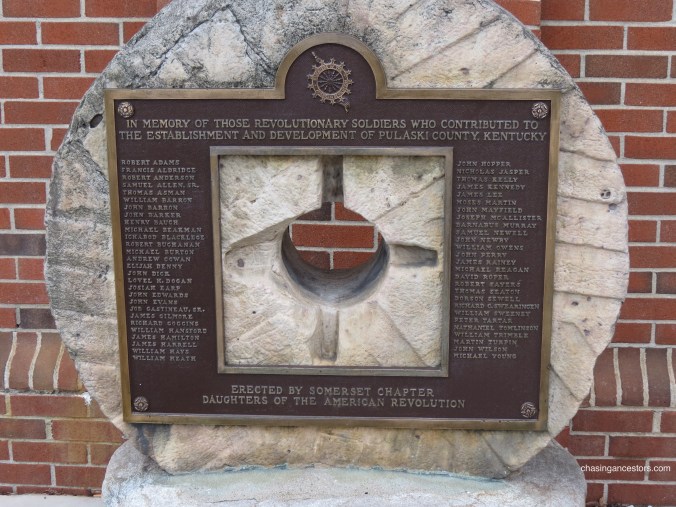On July 4, 1776, a group of men representing the colonies signed a Declaration of Independence from the Crown of England. But the fight for that Independence continued for 5 more years. All of the colonists would have been involved, choosing sides, even if not actively fighting.
While researching ancestors from Kentucky, we took a trip to Somerset, the Pulaski County seat. While there, we came upon the DAR monument “In Memory of Those Revolutionary Soldiers Who Contributed to the Establishment and Development of Pulaski County, KY.”

We noticed a familiar name on the monument.

Was this one of our Earp/Erp ancestors? And what was his story regarding the Revolution?
Turns out, Josiah is an ancestor of mine. He was the father of Singleton Erp, who was the father of Allen, who moved to Indiana, served in the Civil war, and was the subject of my first blog post. Josiah is my GGGGG Grandfather. Josiah was born March 10, 1761 in Montgomery County, Maryland. He died November 25, 1844 in Pulaski County, Kentucky.
So what about the “Revolutionary Soldier” part of his story? The site, Fold3.com has copies of Josiah’s request for pension, based on the legislation from June of 1832. This law allowed full pay for soldiers who served more than 2 years and partial pay for those serving under 2 years but at least 6 months.
There are 8 pages included in Josiah’s file on Fold3.com. The digitized records are a little difficult to read as this partial page indicates:

In essence, Josiah appeared before the court at Pulaski County on November 18, 1833. He was 72 years old at the time. He testified that “while a resident of Montgomery County, State of Maryland, according to his present recollection, in the month of March 1781 he volunteered for the Term of nine months in the Company of Captain John Nichols, the Lieutenant’s name was Thomas Nichols. After he volunteered he was marched to George Town…We were rendezvoused at Montgomery Courthouse in the state aforesaid and at that place received the proper arms and accoutrements for the service and was there a short time harried & exercised and from thence was marched to George Town, now in the District of Colombia, and was there stationed remained there engaged until news arrived that Lord Cornwallis had retreated towards North Carolina; was then directed by the Commanding Officers to return home but to carry with him his arms & other accoutrements and to hold himself ready to march into the service immediately when called on. The whole company were dispersed under like orders. In a few days after his return from George Town, he was again together with the rest of the Company to which he belonged, ordered into the service of the United States by his Commanding Officers and was ordered to march to Dumfries, a small town beyond Bladensburg and while on the march, our Officers were informed there was no need of our services at that point & was then directed to return home but to hold ourselves in readiness to march again into the service when called on. After the Surrender of Lord Cornwallis, he together with the rest of the Company was called in to the Service by the Commanding Officers and were then marched to Frederick Town, Maryland to Guard the prisoners taken at the Surrender of Cornwallis & continued there engaged in that service until about the 15th day of December of that year and was then discharged from the service. He received no discharge in writing.”
So breaking down his service, he was a single man, 20 years old when he volunteered. Most of his time in the service was spent around the area which would become Washington D.C. Seems like he prepared for the fight, but never had to. Cornwallis went to North Carolina & was victorious at the battle of Guilford Courthouse March 15, 1781. Then at the Battle of Yorktown, Virginia, his troops were greatly outnumbered & Cornwallis surrendered on October 19, 1781. So Josiah guarded prisoners for about 2 months before he was discharged. According to his papers, he received an annual pension of $20, starting March 4, 1831, until his death in 1844. The paperwork also indicates that Josiah was “entirely illiterate.” He moved to North Carolina and lived there about 4 or 5 years, then in 1817 he moved to Pulaski County, KY.
So no great war stories from his statement. Just the story of a young man ready to contribute to the fight for Independence, waiting for the call to arms. His contribution was at the end of the war, guarding British prisoners. But even that service was needed at the time.
© MJM 2017